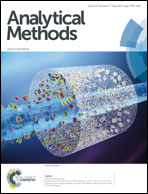Studies on the biological character of a new pH-sensitive doxorubicin prodrug with tumor targeting using a LC-MS/MS method
Abstract
A pH-sensitive doxorubicin (Dox) prodrug was prepared, and its release in vitro and distribution in vivo were studied by using a high performance liquid chromatography combined with tandem mass spectrometry (LC-MS/MS) method. The prodrug, mPEG–P(LA-co-DHP/Dox) (P(Dox)), was amphiphilic in nature, with a hydrophilic mPEG block and a hydrophobic P(LA-co-DHP/Dox) block. The Dox was connected to the carrier polymer chain via a hydrazine linkage. The in vitro release results showed that the release rate of Dox from P(Dox) in acidic medium (pH = 5.0) was dramatically higher than that under physiological conditions (pH = 7.4). The absorption of Dox from P(Dox) in HeLa cells was much faster than that of free Dox. The MTT cell viability study demonstrated the higher cytotoxicity of P(Dox) than free Dox at the same concentration. The Dox concentration from P(Dox) in the mouse liver was dramatically higher than those in other tissues. The above results showed that P(Dox), as a prodrug of Dox, greatly favors the bioavailability of doxorubicin and prolongs its circle time in vivo.


 Please wait while we load your content...
Please wait while we load your content...